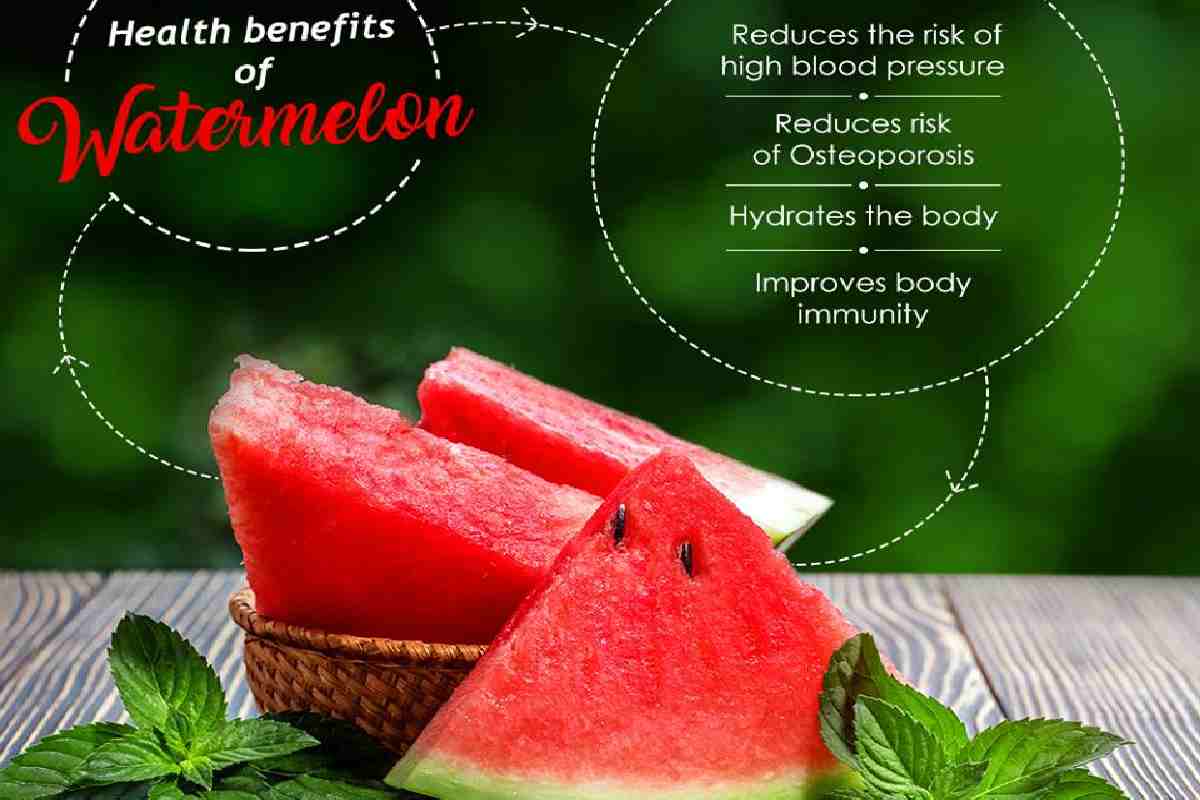Benefits of Watermelon – There are many misconceptions when it comes to the nutritional value of watermelon. For example, many people mistakenly believe that watermelon can only offer sugar and water to the human body. Therefore, eating it is worthless as it only increases our body weight and blood sugar levels.
Of course, this myth prevailed, especially in the last century. However, during the 21st century, people have started to see watermelon as a highly nutritious food that boosts our immune system.
Table of Contents
12 Amazing Health Benefits Of Eating Watermelon:
- Promotes the cardiovascular system
- Anti-inflammatory properties
- Watermelon contains antioxidants that work against cancer
- Improves bone health
- Improves digestion
- Reduces blood pressure
- Promotes fat burning
- Helps control diabetes
- It helps improve kidney health
- Promotes skin and hair health
- Protects the eyes from age-related disorders (especially the yellow flesh varieties)
- Helps with anxiety
However, watermelon should remain consumed in average amounts and as part of a balanced diet like any other food.
Benefits of Watermelon According to the USDA, 100g of raw watermelon contains (among other things):
- Water 91.45g
- Energy 30kcal
- Protein 0.61g
- Total lipids (fat) 0.15 g
- Carbohydrates 7.55g
- Calcium 7 mg
- Magnesium 10 mg
- Potassium 112 mg
- Vitamin C, total ascorbic acid 8.1 mg
- Carotene, beta 303 µg
- Vitamin A 569 IU
- Lycopene 4532 μg
1. Benefits of Watermelon Carotenoids
Carotenoids are antioxidants. One of the many roles of antioxidants is to protect cells from free radicals linked to severe diseases like cancer and heart disease. Watermelon contains a variety of carotenoids such as lutein, zeaxanthin, cryptoxanthin, and lycopene.
Lycopene causes the red and zeaxanthin the yellow colour in some watermelons. Lycopene has been found to help the heart function properly and prevent some types of cancer, such as prostate and breast cancer. In addition, it contributes to intensive skin protection against harmful radiation.
2. Benefits of Watermelon Vitamin A
Watermelon contains B carotenoid, which is converted into vitamin A. 100g of watermelon provides about a fifth of an adult’s daily vitamin A needs. This vitamin contributes to better eyesight and strengthens the immune system, among other things.
3. Complex B Vitamins
Watermelon contains B complex vitamins such as B1, B5 and B6. B6, in particular, is involved in the synthesis of neurotransmitters in the brain, such as serotonin, melatonin, and dopamine, which are known to help regulate anxiety and fear.
4. Vitamin C
Watermelon is an excellent vitamin C source, promoting skin health and boosting our immune system.
5. Potassium
Moreover, watermelon is an excellent source of potassium, which helps lower blood pressure.
6. L-Citrulline
L-citrulline (found mainly in the white part of the crust) is an amino acid that converts to L-arginine. L-arginine and L-citrulline are involved in ΝΟ (nitric oxide) synthesis and promote blood and urea circulation.
7. Dietary Fiber
However, watermelon is an excellent source of fibre. Dietary fibre promotes the proper functioning of the digestive system and controls cholesterol levels. However, we will also refer to watermelon as having a significant amount of FODMAPs. These are fermentable oligo-, di-, monosaccharides and polyols that can have adverse effects in people with irritable bowel syndrome.
8. Carbohydrates
The carbohydrate content in watermelon is close to 7.2 g per 100 g. 6.2 g are sugars such as glucose, fructose, and sucrose.
9. Fat
100g of watermelon has less than 0.2g of fat.
Be careful when eating watermelon!
Like everything in life, there are two sides to eating watermelon. And that’s why we should at least briefly deal with the negative characteristics. Diabetics and kidney sufferers should be careful with this food due to watermelon’s diuretic properties. It also contains potassium, which is particularly harmful to people with diabetes.
The high glycemic index can also cause glucose levels to rise rapidly. Also bad for people with diabetes. However, an excess of lycopene is also a concern for healthy people. Over time, this can lead to flatulence, nausea, vomiting, and diarrhoea. You shouldn’t eat more than two cups of watermelon a day.


